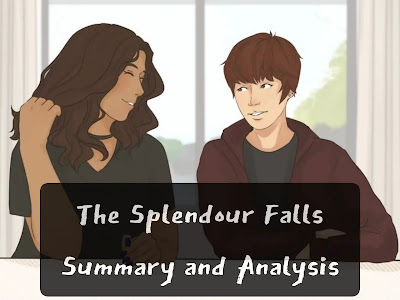Also Read
The splendour falls on castle walls
And snowy summits old in story:
The long light shakes across the lakes,
And the wild cataract leaps in glory.
Blow, bugle, blow, set the wild echoes flying,
Blow, bugle; answer, echoes, dying, dying, dying.
O hark, O hear ! how thin and clear,
And thinner, clearer, farther going!
O sweet and far from cliff and scar
The horns of Elfland faintly blowing!
Blow, let us hear the purple glens replying:
Blow, bugle; answer, echoes, dying, dying, dying.
O love, they die in yon rich sky,
They faint on hill or field or river:
Our echoes roll from soul to soul,
And grow for ever and for ever.
Blow, bugle, blow, set the wild echoes flying,
And answer, echoes, answer, dying, dying, dying.
Introduction
The Splendour Falls is another intercalary song at the end of Canto III of The Princess, inserted by Alfred Lord Tennyson in 1850. According to Aaron Watson, the lyric "was suggested by the blowing of a bugle when the poet was visiting the Lake of Killarney."
Summary
Princess Ida has founded a Female Academy to which no male was allowed enhance. The Prince to whom she is betrothed disguises himself as a girl and gets into the college. The Princess proposes one day to have a scientific expedition. The disguised Prince and his associates accompany the Princess and her maidens. In the evening they see the bright light of the sun falling on the walls of the castle. This beautiful sight is to remind Ida and her maidens of a more permanent kind of splendour the glory of love. The bugle's sound echoes through hills and dales. Though the sound dies out slowly, the response evoked in the heart of the beloved lasts for ever.
Critical Appreciation and Analysis
The song, according to Prof. Wallace, "dwells upon the contrast between the evanescent character of the echoes in the physical world and the permanent and ever-widening sympathies of human hearts — the notes of the bugle sound across the lake, faint and die, those of human affection
Roll from soul to soul,And grow for ever and for ever.
The wild stirring strain emphasises the vital truth that in all noble endeavour, man’s energy is inspired and his arm strengthened by the recollection of those whom he loves. "Stopford Brooke calls it the best of the six intercalary songs in The Princess. He has special praise for the second verse where, according to him, "by a magical employment of words, the whole of Elfland is created and with it all the romantic tales which echo in the ear."
As for the versification, we note the two rhymes in L. 1 and 3 of each stanza, the alliteration of the sounds 's' and 'I' in the first four lines of the first stanza, with the addition of 'b' in the last two lines, and the lingering echo effect of the last long-drawn out line, with its repetition of "dying". The first stanza (excluding the chorus) deals with sights and the second with sounds, and as if sense is in harmony with sound the sound of the vowels changes in stanza two.
